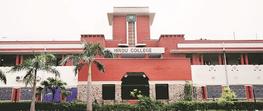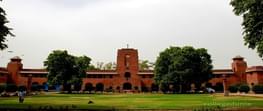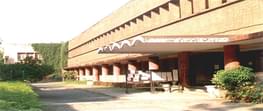Prof. (Dr.) Manvi Seth is the Dean, Professor and Head of the Department of Museology at the National Museum Institute. She has been associated with the NMI since 2002 before which she was the Curator at Decorative Arts, Maharaja Sawai Man Singh II Museum, City Palace, Jaipur.
Dr. Seth has been awarded two prestigious grants jointly with Dr. Sandra Dudley, School of Museum Studies, University of Leicester, from the British Academy and UGC-UKIERI. She has also conceptualized and coordinated research projects in the areas of Visitor Studies, Museum Education and Documentation (Intangible Cultural Heritage). She has also been organizing educational workshops for underprivileged and marginalised children as templates for museums in India and has coordinated international and national seminars and conferences.
Prof. Seth has curated the Community Museum in Gya, Ladakh and has also curated many exhibitions. Prof. Seth is the recipient of the prestigious Nehru Trust UK Visiting Fellowship. She has been awarded the “Best Professor” award by the Dewang Mehta National Education Awards and has also successfully completed the Leadership Training Programme organised by the Ministry of Culture, Government of India, in collaboration with the British Museum. She is also the Chair of, the Intangible Cultural Heritage Working Group, CIDOC.

Being a Head of your Department, what are your roles and responsibilities towards the students?
As the HOD, it’s my responsibility to ensure that the course curriculum and lectures align with recent academic research in the field of Museum Studies. I also need to help create learning opportunities for my students to gain practical experience in this field. I ensure that every student gets proper exposure and apart from providing theoretical knowledge, I aim to provide practical training to them so that they can be trained and can face any challenge they encounter in the future.
How does the program ensure that students are prepared for the challenges of the future?
This two year course is multidisciplinary in approach with a focus on providing practical experience in the field which is important while engaging with projects/institutions aimed at preserving and promoting cultural heritage. This course requires practical and on-ground training as well as experience to have complete knowledge about the course and to complete the projects, practical experience is given to our students.
What are the benefits and career options after pursuing this course?
After completing the course, the students can apply to museums, art galleries, and cultural institutions as curators, museum educators, docents, and researchers. They also have the option to pursue a PhD in Museum Studies or other related fields. We offer an M.A. degree in Museology as a full-time course. We offer ample scope to study for a Master’s degree to focus on special subject matter for research or to meet various requirements at every step of a museum career. Pursuing research in this institute has played an influential role in weighing the originality of research work. Since museology is an interdisciplinary subject, PhD students can work in diversified fields including archaeology, art history, anthropology, management, cultural heritage, and so on.
How do you help your student to cope up with the competition being so high in the outside world?
As educators, it’s our responsibility to provide a learning environment for the students where they can hone their skills and encourage a self-affirming attitude that allows them to face any competition with confidence. As a HOD, it's my role to help students face the outside world with strength, courage, and confidence. Thus, students are always provided with a learning and interactive environment in the institute where they can share their thoughts and issues, so that we, as educators and mentors, can provide them with all the support and guidance they need.
What are the challenges you faced/ are facing to uplift the quality of education of your department?
As this course is an interdisciplinary subject, practical experience is necessary for the students to get proper exposure. This is a challenge for us, and to address this, we try to engage museum professionals and teachers who can orient the students towards recent trends in the field of culture and museum studies. As we live in an era that is constantly changing and new trends are coming, we need to orient the students towards these trends more and more.
What do you see as the department's/ college's greatest strengths and how it can be enhanced?
The biggest strength of the National Museum Institute of History of Art, Conversion, and Museology is its faculty, professors, and students. It is because of them that the institute is able to reach great heights. The environment that they create adds to the strength of the university. We have a self-sustaining ecosystem that nurtures growth and is flexible to new ideas and constructs.
Check National Museum Institute Of History Of Art Conservation And Museology Admission 2023
How do you prepare yourself for effectively delivering the program to the students?
Being the Head of the Department of Museology, I keep myself updated with all the knowledge that is necessary as a professor to effectively communicate with the students in such a manner that they can get practical experience in the field. I also keep myself updated about the recent trends in the field of culture and museum studies. My responsibility towards the students is to provide them with learning and an open environment.













































Comments